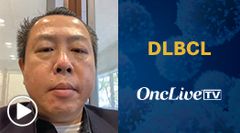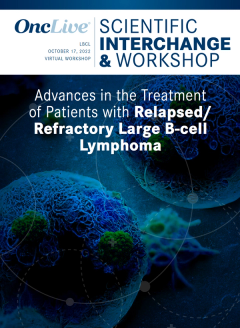
Dr. Moskowitz on Antibody-Drug Conjugates in Relapsed/Refractory DLBCL
Craig Moskowitz, MD, discusses the efficacy of several antibody-drug conjugates in diffuse large B-cell lymphoma, how their adverse effect profiles compare, and how bispecific antibodies are further defining the DLBCL treatment landscape.
Craig Moskowitz, MD, professor, physician-in-chief, Oncology Service Line, Sylvester Comprehensive Cancer Center, University of Miami, discusses the efficacy of several antibody-drug conjugates (ADCs) in diffuse large B-cell lymphoma (DLBCL), how their adverse effect (AE) profiles compare, and how bispecific antibodies are further defining the DLBCL treatment landscape.
Dr. Moskowitz on Tafasitamab Plus Lenalidomide in Relapsed/Refractory DLBCL
Tafasitamab-cxix (Monjuvi) plus lenalidomide (Revlimid) is an easy regimen to use in patients who are not heavily pretreated, Moskowitz says. However, although the combination elicited favorable outcomes in patients enrolled in the phase 2 L-MIND trial (NCT02399085), the real-world patients receiving this regimen as a standard of care are demonstrating lower response rates, Moskowitz notes.
Dr. Moskowitz on Loncastuximab Tesirine in Relapsed/Refractory DLBCL
Loncastuximab tesirine-lpyl (Zynlonta) is an active agent that’s easy to administer, especially now that initial issues with fluid overload and third spacing are more manageable in most patients, Moskowitz says. Patient response can be determined during a 5- to 6-week trial period, and patients who do not respond after 2 cycles are not likely to respond at all, Moskowitz explains. This agent is effective when administered prior to tafasitamab plus lenalidomide, Moskowitz notes.
Dr. Moskowitz on Polatuzumab Vedotin Plus Rituximab in DLBCL
Polatuzumab vedotin-piiq (Polivy) plus rituximab (Rituxan) is an active, well-tolerated combination in DLBCL, and is easier to administer than loncastuximab tesirine, Moskowitz says. Additionally, the phase 3 POLARIX trial (NCT03274492), in which up-front polatuzumab vedotin plus R-CHP (rituximab, cyclophosphamide, doxorubicin, and prednisone) demonstrated a 27% reduction in the risk of disease progression, relapse, or death vs R-CHOP (rituximab, cyclophosphamide, doxorubicin, vincristine, and prednisone), may posit this combination as the first-line standard of care, rather than an option in the second- and third-line settings, Moskowitz emphasizes.
Dr. Moskowitz on Adverse Effects With DLBCL Treatments
The most common AEs that occur with tafasitamab plus lenalidomide, loncastuximab tesirine, and polatuzumab vedotin plus R-CHP are fatigue, fluid third spacing, and neuropathy, respectively, Moskowitz says. However, all 3 of these regimens are generally well tolerated and are fairly simple outpatient therapies, Moskowitz notes.
Dr. Moskowitz on Bispecific Antibodies in DLBCL
Tafasitamab plus lenalidomide, loncastuximab tesirine, and polatuzumab vedotin plus R-CHP have all elicited low complete response rates, making them unideal palliative drugs, Moskowitz says. However, bispecific antibodies appear to be promising in this space, Moskowitz notes. Mosunetuzumab (Lunsumio), which is commonly used in the US, has limited efficacy in large cell lymphoma, but was approved in Europe for relapsed/refractory follicular lymphoma, Moskowitz explains. Additionally, epcoritamab (DuoBody-CDxCD20) and glofitamab are both active bispecific antibodies that, once approved, will likely be used before ADCs in DLBCL, Moskowitz emphasizes.
Dr. Moskowitz on Therapeutic Combinations in DLBCL
Determining how lymphoma drugs work together is crucial, as these agents are not typically used on their own, Moskowitz says. The drugs that are most effective when combined with other active agents are more likely to be used in this arena, Moskowitz concludes.










































